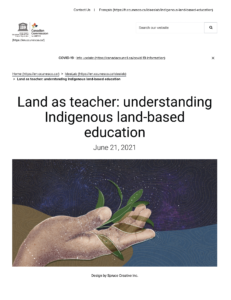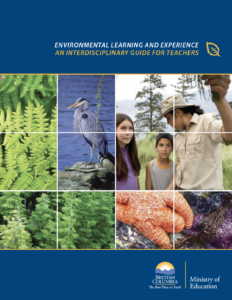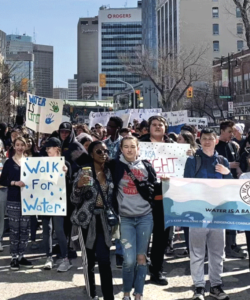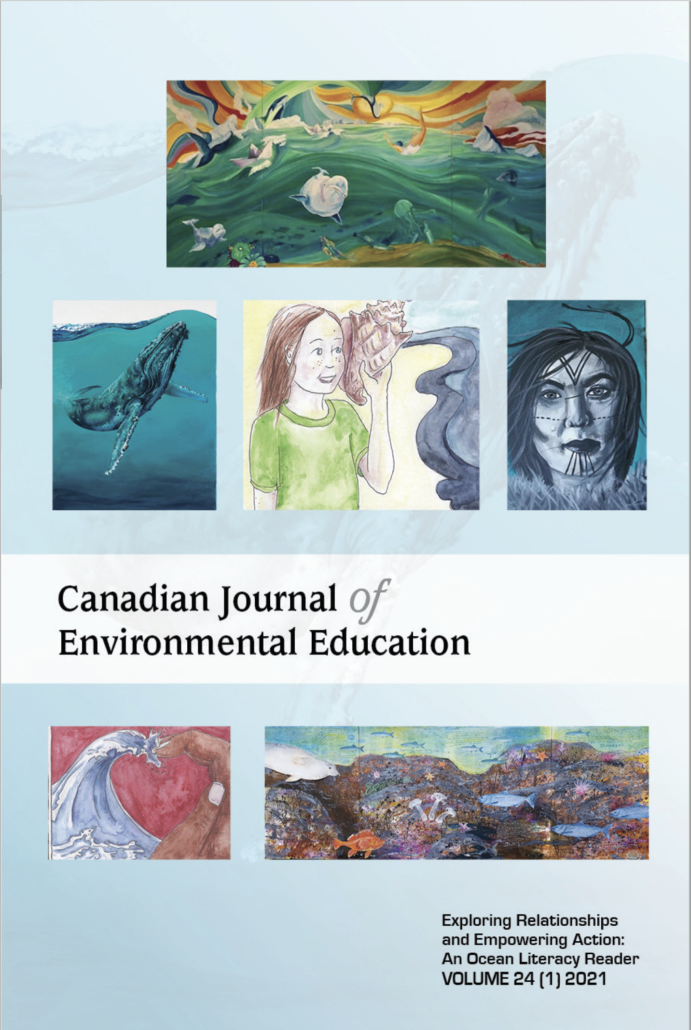Land as Teacher: Understanding Indigenous land-based education

Image credit” https://en.ccunesco.ca/
For anyone who seeks an understanding of what Indigenous landbased education is, it may be instructive to begin by grasping what it is not. If your mind went straight to “taking the classroom outside” or “outdoor education,” bingo: that’s what it’s not. Or at least, that’s not all it is—not by far. A multi-faceted concept, Indigenous land-based education doesn’t lend itself to simple one sentencedeDnitions, and does mean different things to different people. It brings together layered concepts like the importance of language and the geography of stories, cosmologies and world views, land protections and rights, relationality and accountability, a connection to reconciliation, and much more.
It can offer significant benefits to Indigenous people by providing culturally relevant education, promoting opportunities for intergenerational knowledge transfer, and creating safe spaces for healing and learning. And by changing the relationship that many non-Indigenous people have with the land, it has the potential to lead to a healthier Earth for all.
Environmental Learning and Experience: An Interdisciplinary Guide for Teachers

Image credit: BC Ministry of Education
There continues to be a growing concern about the state of the environment, yet we are often confused by the complexities of economic, ethical, political, and social issues related to it. Daily, there are references in the news media to environmental issues, such as global climate change, ozone depletion, dwindling resources, famine, disease, loss of biodiversity, pollution, and continuing job losses in many B.C. communities.
The environmental issues we face, both as individuals and within our broader society, are now so pervasive and ingrained within our cultural ways of being that we can no longer look to science and technology alone to solve these problems. As a consequence, environmental learning can and should include a sustained critique on dominant societal and industrial practices that often contribute to widespread and localized environmental problems.
Climate Change Education in the Canadian Classroom

Image credit: www.edcan.ca
How – and what – are we doing with climate change education? Lakehead University and Learning for a Sustainable Future (LSF) surveyed over 1,000 teachers to understand current climate change education teaching practice in Canada.
Climate change is the most complex and wide-reaching challenge facing humankind today. Reducing the impacts of climate change and moving Canada toward resilience and adaptability for climate impacts will require substantial changes at all levels of Canadian society. It is critical that Canadians understand climate change causes, impacts and risks. An educated public, including youth, is essential to driving the required transformation.
Lakehead University and Learning for a Sustainable Future (LSF) completed a comprehensive survey of 3,196 Canadians to establish Canada-wide baseline data reflecting Canadians’ knowledge and understanding of climate change, perspectives on risks, and views on the role of schools and climate change education. !e survey also provides a nationally unprecedented report of climate change education teaching practice.
The survey collected responses from 1,231 teachers (from across K-12 grades), 571 parents, 486 students in Grades 7-12, and the general public (908). The final report, Canada, Climate Change and Education: Opportunities for public
and formal education, is publicly available. Click here to read more.
A Special Issue of CJEE on Ocean literacy
 This special issue of the Canadian Journal of Environmental Education focuses on varied, place-based relationships with the ocean (and water) across Canada and Turtle Island. It is also closely linked to the emerging relationships and socio-ecological challenges that we all face, both personally and as a society. This issue comes at an historic moment of intense global uncertainty, exacerbated by the ongoing COVID-19 pandemic, as well as by the effects of rapid climate change, which continue to be experienced through increasing extreme weather events, rising temperatures, melting sea ice, and biodiversity loss. This escalating upheaval has exposed more clearly the interconnections between planetary health, human health, justice, and world economies. Multiple and growing social movements (#BlackLivesMatter, #LandBack, #FridaysforFuture, etc.) continue to demand systemic transformations shaped by principles of equity, justice, and accountability. Within the broader global context and its multiple, intersecting challenges, it is easy to feel overwhelmed. However, in collective turmoil lies an opportunity: to critically examine our lives and experiences, our positionality and choices, our behaviours and actions, and our relationships with each other and with our communities. Perhaps most profoundly, there is also an opportunity to recognize and uphold the connections that fundamentally unite us, wherever we call home: the land, the water, and the ocean.
This special issue of the Canadian Journal of Environmental Education focuses on varied, place-based relationships with the ocean (and water) across Canada and Turtle Island. It is also closely linked to the emerging relationships and socio-ecological challenges that we all face, both personally and as a society. This issue comes at an historic moment of intense global uncertainty, exacerbated by the ongoing COVID-19 pandemic, as well as by the effects of rapid climate change, which continue to be experienced through increasing extreme weather events, rising temperatures, melting sea ice, and biodiversity loss. This escalating upheaval has exposed more clearly the interconnections between planetary health, human health, justice, and world economies. Multiple and growing social movements (#BlackLivesMatter, #LandBack, #FridaysforFuture, etc.) continue to demand systemic transformations shaped by principles of equity, justice, and accountability. Within the broader global context and its multiple, intersecting challenges, it is easy to feel overwhelmed. However, in collective turmoil lies an opportunity: to critically examine our lives and experiences, our positionality and choices, our behaviours and actions, and our relationships with each other and with our communities. Perhaps most profoundly, there is also an opportunity to recognize and uphold the connections that fundamentally unite us, wherever we call home: the land, the water, and the ocean.
